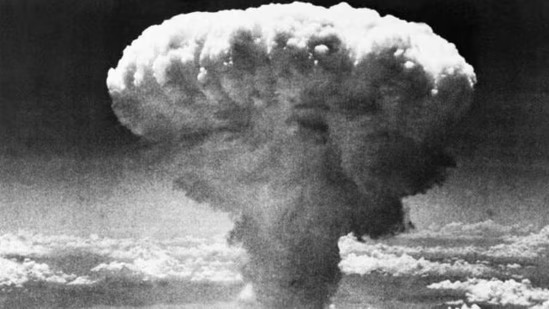Japan’s Prime Minister, Yoshihiko Kishida, expressed condolences to the victims of the horrific attack, stressing that Japan will continue its efforts to achieve a world free of nuclear weapons.
A mushroom cloud rises moments after the atomic bomb was dropped on Nagasaki, southern Japan, in this August 9, 1945 file photo. (Photo courtesy of AP)
Nagasaki, Japan, observed the 78th anniversary of the US atomic explosion on Wednesday. On August 9, 1945, the United States detonated the second nuclear bomb named ‘Fat-man’ on the southern Japanese city, three days after Hiroshima was destroyed by the first – a uranium bomb named ‘Little Boy’.
Fumio Kishida, Japan’s prime minister, expressed condolences to the victims of the horrific attack, stressing that Japan will continue its efforts to achieve a world free of nuclear weapons.
“I would like to express my heartfelt condolences to the souls of the atomic bombing victims, as well as my heartfelt sympathies to those who are still suffering from the aftereffects.” The tragedy that occurred 78 years ago today in Nagasaki must never be repeated. As the only country to have been bombed with nuclear weapons, we will continue to work to achieve a world free of nuclear weapons,” he stated in a video statement.
“I would like to reiterate my commitment to doing everything possible to achieve a world free of nuclear weapons and lasting peace,” he continued.
In remembering the tragic attack and its victims, United Nations Secretary General Antonio Guterres stated that the world should never let such tragedy to occur again and advocated that nuclear weapons be eliminated to eliminate the nuclear risk.
“Atomic weapons were used on Nagasaki 78 years ago. We must never allow such tragedy to happen again. “The only way to eliminate the nuclear risk is to eliminate nuclear weapons,” UN Secretary-General Ban Ki-moon stated on X (previously Twitter).
What happened on August 9, 1945?
As World War II progressed, the United States and its allies worked to terminate the battle with Japan. The decision to use nuclear weapons was motivated by a desire to hasten Japan’s capitulation and avoid a long and costly invasion. Following the ‘Trinity Test’ on July 16, 1945, the United States launched the first atomic bomb on Hiroshima on August 6, nicknamed ‘Little Boy,’ killing around 1,40,000 people by the end of the year.
The ‘Fat Man’ bomb that was dropped on Nagasaki was code-named. It claimed the lives of over 80,000 people. This resulted in Japan’s unconditional surrender during World War II. At least 70,000 people were killed in the first Nagasaki blast, and another 70,000 perished later from radiation-related illnesses. Enola Gay, a US warplane, dropped the ‘Fat Man’ about 1,650 feet above Nagasaki. This resulted in Japan’s unconditional surrender during World War II.
Nagasaki Day is held around the world to promote peace and raise awareness about the dangers of nuclear weapons. This day is significant since it focuses on anti-war and anti-nuclear demonstrations in numerous countries.





